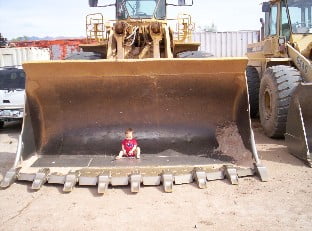For an application for the Universal Equipment Operator Apprenticeship Click Here.
The Local 49 Apprenticeship Program is a 6,000 on-the-job training hours along with 432 hours of related training at the Training Center. The apprentice benefits not only from the training, but also receives a fair wage as their skills increase, along with a both an unbeatable Health & Welfare package and a pension plan that starts building immediately.
Qualifications to be considered for apprenticeship with Local 49:
- Minimum age of 18 years old.
- Must have a valid driver’s license.
- Must hold a high school diploma, GED or equivalent.
- Must pass an entrance examination as determined by the JAC. The test will be administered by a qualified employee of the Local 49 Training Center.
- Applicants that do not achieve a passing score on the entrance examination may re-test in seven days. There will be a six-month wait to re-test after two attempts have been made to pass the examination.
- Must be physically fit for work in the craft with or without reasonable accommodation.
- Be legally authorized to work in the United States.
Steps to become an Local 49 apprentice
Step 1
- Fill out the online application.
- Once the online application is completed, you will receive an email that will
outline directions for you to schedule the examination. - Take the exam. In order qualify for apprenticeship, you will have to take and pass an entrance examination that covers basic reading, math, and measurement.
- Bring a valid driver’s license and a copy of your official high school diploma, GED or equivalent to the exam.
Step 2
- Pass the exam and receive letter of eligibility for apprenticeship.
- The letter of eligibility for apprenticeship can be taken with you to contractors offices.
- You will be provided with a list of signatory contractors.
Step 3
- Once you have been issued a letter of intent to hire from a signatory contractor, you will be indentured into the Local 49 Apprenticeship program.
- You will receive more information and training.
What is an Apprenticeship?
Apprentices have a long history dating back to ancient Greece when young workers entered a term of service, now called indentureship, to a skilled tradesperson to learn a craft. Things are much the same today. Currently, an apprentice is an employee who learns a skilled trade through planned, supervised work on-the-job, while at the same time receiving related technical classroom instruction. Apprentices are required to sign an indenture agreement with their Joint Apprenticeship Committee/Trade Improvement Committee that outlines the requirements and expectations of an Apprentice Operating Engineer.
Apprentices are taught the proper use, care, and safe handling of the equipment used in connection with their work and, of course, the important skills necessary to become a successful Operator.
While working on-the-job and acquiring skills, apprentices are a regular part of the work force on whom contractors and co-workers rely. Apprentices are also required to attend classes and complete the prescribed courses related to the trade in order to complement their on-the-job training. If the on-the-job or school work is not satisfactory, they may be dropped from the program or sent back to repeat that segment of training.
Due to the nature of the occupation and differing geographical work sites, individuals making application for this program must have their own personal means of reliable transportation.

Pulling our weight!
On the job training
The total time spent in the program will ultimately be based on the apprentice’s ability to comprehend various subjects and apply them to various tasks. The minimum time spent in the Universal Equipment Operator Apprenticeship Program shall be 6000 hours (minus previous experience.) A person who is unable to achieve the goals set forth in the training outline will be offered remedial help. However, if a person is unable to comprehend the subjects after additional time is given or fails to comply with the standards of Apprenticeship, they will be removed from the program.
For every 2000 hours of on the job experience, an Apprentice is required to receive a minimum of 144 hours of related instruction via our Training Center’s Apprenticeship program.
Operating Engineer Career Information
Nature of Work
Members of the International Union of Operating Engineers (IUOE) cover a variety of job classifications in industries such as Highway and Building construction, cranes, mining, logging, pipeline construction, and utility work such as water and sewer excavations.
Operating Engineers can be found on any project that utilizes construction equipment. This is a blanket term for numerous types of machines: cranes, bulldozers, front end loaders, rollers, backhoes, graders, skid steers, dredges, hoists, drills, pumps, and compressors are just some of the equipment used in this trade.
In most cases, if it can push, pull, pump, lift any type of material, rolls on tires, crawls on tracks, it falls under the jurisdiction of the IUOE. Operating Engineers take pride in the fact that on virtually all construction projects; they are the first workers on the job and usually the last one off. Their work is essential to a smooth-running construction project.
Although each union member has a favorite type of machine to operate, Operating Engineers are masters of a variety of equipment.
This versatility keeps them employable, since employers’ needs vary from project to project and from site to site.
Working Conditions
Almost all of the work performed by Operating Engineers, including some of the mechanics’ work, takes place outdoors, in all kinds of weather and conditions. Members can expect to be cold in the winter, hot in the summer, dirty, greasy, muddy, and dusty all of the time.
Construction work is directly affected by the climate of a geographical area. The construction industry as a whole has a slowdown or shutdown period during the winter season. The length of this period depends on weather conditions: it could last anywhere from several weeks or up to several months. Applying for unemployment benefits during this slowdown/shutdown time is part of the life of being an Operating Engineer, or for that matter, a craft-worker in any of the construction trades. With the right planning, this can be a positive experience, allowing the operator the flexibility to do things that there was no time for during the peak working season.
As in all construction jobs, the length of time a member works for an employer varies with the type of project. Larger projects, such as a new bridge or stadium, can employ and Operating Engineer for years, while more typical projects last less than one year, sometimes even just a few days or weeks. In general, a union member can expect to work for more than one employer during the course of a year. In many IUOE local unions, members are dispatched to work from a roster, based on their training and qualifications. This is usually called being sent out from the Out-of-Work list that is maintained through the local union halls dispatch office.
Also, remember that the construction industry is considered a barometer of the economy. In a nutshell, when the economy is healthy, there’s lots of work, but when the economy slows down (such as during a recession), so does the availability of work, sometimes for a long period of time.
Training and Other Qualifications
Universal Equipment Operators usually learn their skill through apprenticeship training at the training center and on-the-job training. They may start by operating light equipment under the guidance of an experienced operator. Later, they may operate heavier equipment such as dozers and cranes. However, it is generally accepted that formal training provides more comprehensive skills. Some heavy equipment operators train in established apprenticeship programs, administered by union-management committees. Because apprentices learn to operate a wider variety of machines than do other beginners, and usually have better job opportunities. Apprenticeship programs consist of on-the-job training (6000 hours) and 432 hours of structured classroom training at the training center.
Operators need to be in good physical condition and have a good sense of balance, the ability to judge distance, and good eye-hand-foot coordination. Some operator positions require the ability to work at heights.
Working Hours
Sometimes Operating Engineers work projects that run around the clock, but even projects that operate during the “regular hours” of 7:00 AM to 5 PM, Monday through Friday, can have overtime hours. Employers may want to make the most of favorable working conditions, or need to catch up on days missed because of bad weather. Operating Engineers may be expected to work out of town for as little a couple of days or up to, as much as, a couple of months.
On many projects, Operating Engineers must finish specific tasks before other trades can even begin to work, and on almost every project, each trade is dependent on another to stay on schedule.
How Apprenticeship Prepares You

Never Too Early To Start!
An apprenticeship program with the Operating Engineers will prepare you to work as a universal equipment operator or mechanic in the Heavy Equipment construction industry.
“Heavy Equipment” describes many types of machines used on a construction site, including cranes, bulldozers, forklifts, haul trucks, rollers, skid steers, motor grader, scrapers, front-end loaders and paving equipment.